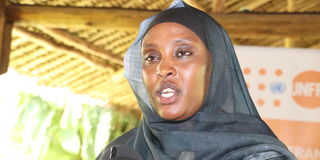County First Ladies intensify anti-FGM campaigns

County First Ladies Association Chairperson Alamitu Jattani, speaks during a forum in Diani, Kwale County. The Marsabit First Lady raised concerns over new tricks being used to practice FGM.
What you need to know:
- County First Ladies have raised concern over the increased cases of FGM despite stakeholders’ and government efforts.
- Marsabit County First Lady explained that through the association, they will support programs that address emerging trends of FGM like medicalization, changes in age and religious misinterpretations.
County First ladies have intensified their campaign against Female Genital Mutilation (FGM), early marriages and gender-based violence (GBV).
Through the County First Ladies Association (CFLA), the governors’ spouses raised concern over the increased cases of FGM despite stakeholders’ and government efforts.
Speaking during a two-day sensitization in partnership with the United Nations Population Fund (UNFPA) in Kwale County, the association chairperson Alamitu Jattani, said communities practising FGM have devised new ways of abetting the vice, leading to a rise in cases.
“Since it is now illegal, some communities are performing the cut with the help of medical personnel in secluded areas including hospitals, and it has become more difficult to monitor this,” she said.
Emerging trends
The Marsabit County First Lady explained that unlike before when the ceremonies would be done in public, and for a group of girls, it is now done in secret since most parents know they risk being arrested.
She explained that through the association, they will support programs that address emerging trends of FGM like medicalization, changes in age, religious misinterpretations and the types of FGM being practised.
Elgeyo Marakwet County First Lady Fiona Kiprotich, said the prevalence in the county remains high, at 75 per cent.
“If we come together as champions in our respective communities, we shall find solutions that will address such issues gradually,” she said.
UNFPA’s GBV and Gender Advisor in Kenya Caroline Murgor, said it will take financial, research and technical support for the first ladies who will spearhead the fight against the country to succeed.
She explained that FGM is still being performed as a cultural practice, but communities should instead focus on progressive culture rather than use it as an excuse for perpetuating harmful practices.
"Since they are the faces of women and girls in their communities, we would like to support them to enhance their advocacy skills so that they can support the people in the villages," she said.
The partnership between the two will also involve stakeholder meetings with the Anti-FGM Board, and numerous campaigns in affected countries that will see women educated on the harmful effects of FGM, as well as alternative rites of passage.
Safe environment
She added that they would soon incorporate the First Gentlemen from seven counties who will also help in addressing matters of mental health and violence against men in society.
“We often forget that men also face challenges. We need to create a safe environment where men can also express how they feel, not as champions on issues affecting girls, but also speak up on issues that affect them,” she said.
The first ladies said Kenya has 22 counties that are actively practising FGM, majorly leading to early marriages and school dropouts for young girls.
Former President Uhuru Kenyatta had committed to eradicating FGM by the end of 2022, and current President William Ruto has equally committed to ending the vice by the end of his tenure.
"FGM should not be a conversation we are having in Kenya in the 21st Century. I want to assure support from my administration in the elimination of FGM as it is retrogressive and a danger to the health of our girls,” Ruto said





